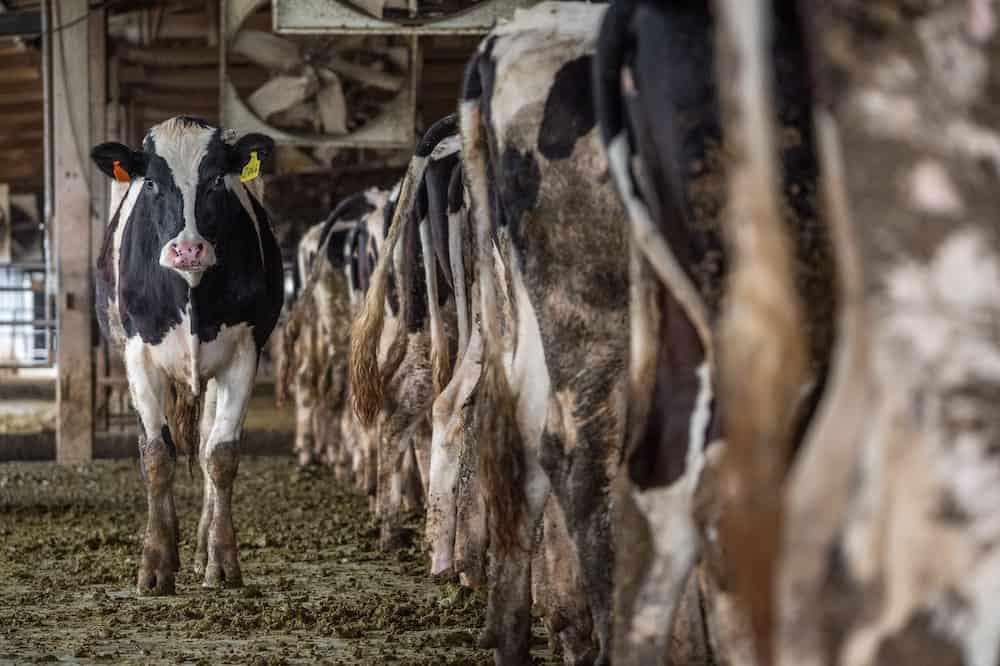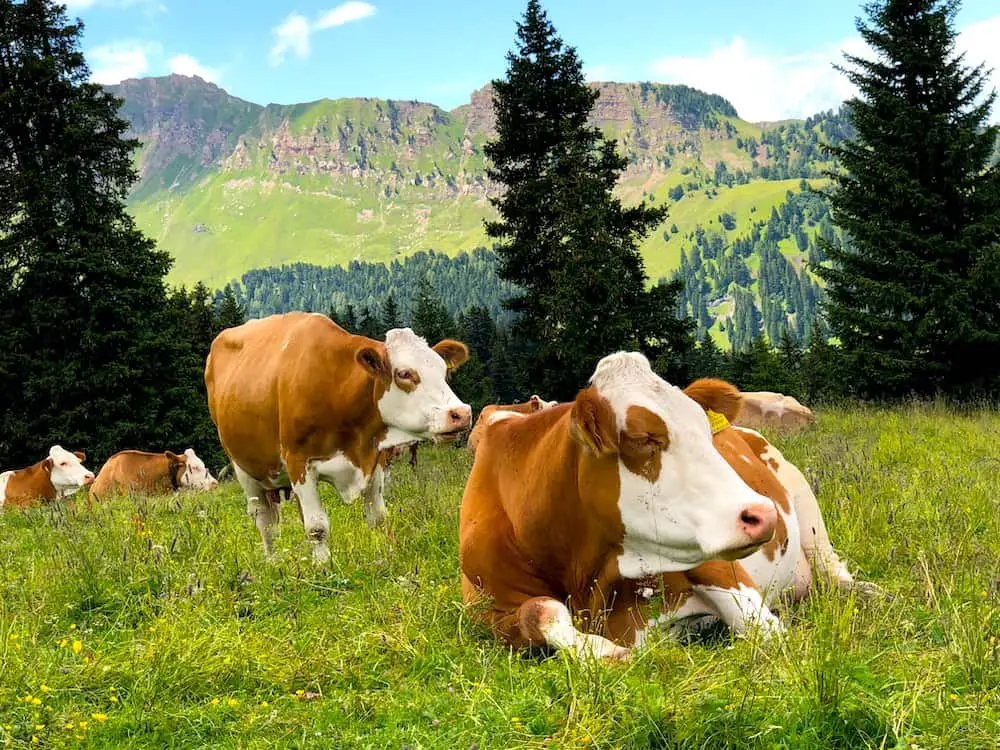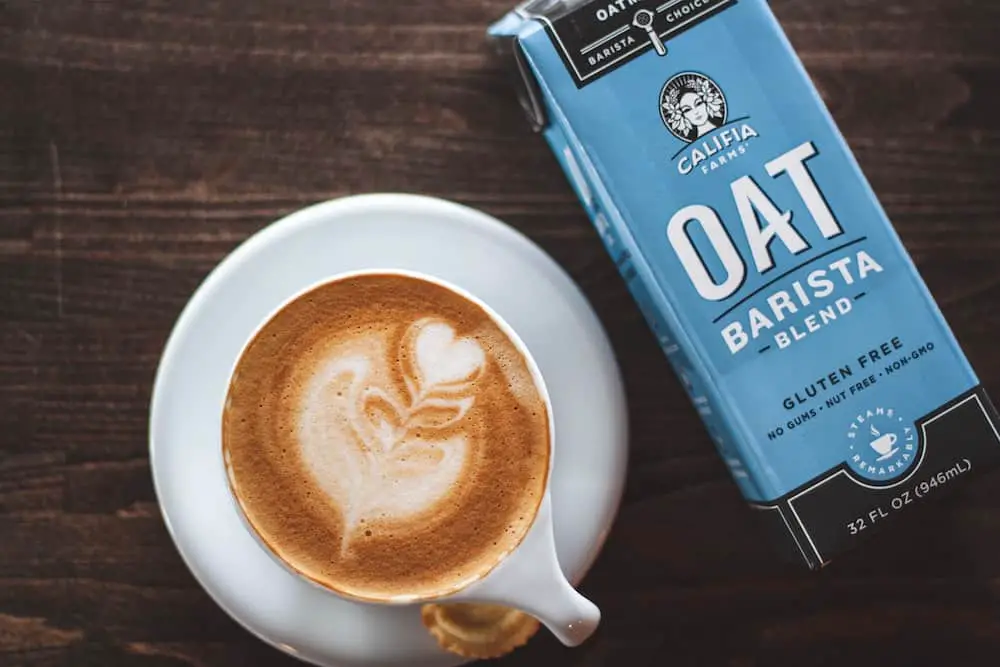Plenty of new vegetarians or those who want to dive into a vegetarian lifestyle will still consume dairy products. They consume dairy for two reasons: it’s a source of protein, and most believe that dairy is cruelty-free. But this simply isn’t the case.
Even products that are labeled slaughter-free, Animal Welfare Approved, or Certified Humane doesn’t necessarily mean it’s 100% cruelty-free.
Dairy can be cruelty-free to a certain extent. Some farms strive to offer dairy products humanely. They do not perform the typical inhumane acts of slaughtering the young males that can’t produce milk. However, even cruelty-free dairy farms still need to enforce a couple of unethical practices, such as separating mom and baby.
Dairy might not seem cruel until you look deeper into the facts. This blog will shed light on how even organic, cruelty-free, and humane dairy farms might not always be so compassionate. We’re also going to share some awesome dairy alternatives that won’t leave you missing cheese, cream, butter, and other dairy favorites.
The Cruelty of Dairy
Many people don’t think about animal cruelty when drinking milk or using butter on their breakfast toast. Since there is no slaughtering taking place, then the cows must not be suffering – right? Sure, this is a positive way of thinking; but it’s not the truth.
The truth of the matter is that most dairy farms act inhumanely with the cows - it’s just not as evident as slaughter farms. Here are some of the top ways in which cows are mistreated on dairy farms.
Newborn Cows Are Taken from Their Mothers
Cows are more than just milk machines and cheeseburgers. They are sentient beings. Just as any mother would, a cow forms an instant bond with its baby calf. They want to stay with their baby and give them love, not to mention they want to provide them with the nutrition they deserve.
Unfortunately, dairy farms remove calves from their mother within the first one to three days of their life. Usually, it occurs within the early 12 hours of life. The sudden separation leads to extreme emotional distress for both the baby and mother cow. The break also leads young calves to have social issues as they get older.
Young Cows Don’t Get the Nutrition They Need
Since calves are taken from their mothers almost immediately, they aren’t able to nurse as they are meant to. Instead, calves only a few days old are fed unhealthy milk replacers. Sometimes, these milk replacers contain harmful substances such as cattle blood. Without proper nutrients, calves are not able to grow as strong as they usually would.
Cows Are Kept Continuously Pregnant
Cows are forcefully impregnated at least once a year to produce “enough” milk for the demand. It is performed unnaturally, with artificial insemination. The constant impregnation of the cow leads to emotional and physical damage.
And it doesn’t stop there – maximizing milk production leads to premature death and illness in mother cows. A cow’s lifespan can be cut in half, if not more, due to the excessive stress placed on the body.
Horrible Living Conditions
Most people are aware of the horrid living conditions in slaughter farms, but many people won’t clump dairy farms into the mix. Unfortunately, though, plenty of dairy cows are living in just as horrible conditions.
These cows do not have a whole lot of space and live their life on concrete floors rather than grazing happily. Their diets aren’t much better, either. Antibiotics and hormones are added to manipulate a cow’s genetics and create more milk that is necessary.
After all, cows are just like any other mammal – they only produce what their baby needs. To have enough milk for supply and demand from humans, they are forced to make more in an unhealthy way.
Aside from antibiotics and hormones, some dairy farm cows are fed an unnatural diet that consists of far more protein than necessary. Sometimes, their food contains animal-based ingredients like chicken feathers and fish. These are not ideal for herbivorous cows, who would much rather munch on grass.
Mastitis Can Occur
Mastitis is a severe inflammation of the mammary glands. As you may have guessed, dairy farm cows are more prone to this painful inflammation than free-range cows. Why? Because continuous milking, which is unnatural, can allow for bacteria to enter the milk ducts. When mastitis is found, the infected cow is likely to be sent to the slaughterhouse.
Young Males and Extra Females are Slaughtered
Perhaps the worst problem with dairy farms is the slaughtering of young male calves and extra females. These young “extras” are kept alive for a short time before they are slaughtered and used for veal.
During this time, they are fed a low-iron milk substitute that helps them gain weight and keep the flesh pale and soft.
Veal production takes cruelty to a new level and it’s not for the faint hearted whatsoever. But it’s worth learning about because it’s a practice that needs more global awareness. If you’re ready to find out more, you can take a look at this article: Is Veal Cruel?
Are Any Dairy Farms Humane?
With such outrage from the community regarding animal welfare, more people are becoming wary of consuming animal products. Factory-farmed goods are becoming less and less popular, even when it comes to dairy. This is because there are next to no regulations on these high production farms, which would lead anyone to believe it is cruel and inhumane.
But what about the farms that are enacting “humane” practices? What about products that are labeled Animal Welfare Approved or Certified Humane? Are these entirely cruelty-free products? The best answer is almost. While these labels show a goal towards complete humanity, a few inhumane practices are performed on these farms.
Animal Welfare Approved
When you’re looking for cruelty-free products, the best bet is to find products labeled as Animal Welfare Approved (AWA). This label comes with many benefits for animals and consumers. For example, animals who are raised on an Animal Welfare Approved farm will have the following services:
The AWA seal is only permitted for independent farms. That is why many consumers looking for cruelty-free will look to their local farms rather than the grocery store for their goods. Research has proven that independent, smaller farms offer the best welfare for animals.
Now, these are several benefits that anyone would agree are excellent for cows. But there are still one or two clauses that are less than favorable. One aspect that is still okay under this permit is the castration of cattle without pain relief – which is, obviously, inhumane.
Certified Humane Raised & Handled
Another popular label that gives consumers hope for cruelty-free dairy is the Certified Humane Raised & Handled seal. (Not to be confused with the American Humane Certified seal, which is not recommended). Here, animals are given plenty of excellent benefits they wouldn’t find in a big production industry. Some of these advantages include:
Again, it’s not all great for animals raised on a Certified Humane Raised & Handled farm. Some animals do not have outdoor access and are not required to be raised on a pasture, their standard setting. A variety of physical alterations, such as castration, can be done without administering pain medicine.
Another drawback of Certified Human Raised & Handled is that their inspections are typically done by internal inspectors rather than third-party inspectors. Why is this a negative? Because internal inspectors don’t have to report things they find as inhumane if they don’t want to. Plus, they only inspect about 10% of the farm, leaving room for cruel techniques that go unnoticed.Global Animal Partnership
The Global Animal Partnership, or just G.A.P., is an up-and-coming way of certifying animal products. Their certification is a 5-leveled system, starting with Animal Welfare Certified being the lowest level. The five groups consist of:
How is this beneficial for a consumer? Well, you know what you want from your products. If you’re looking for the most humane and cruelty-free products, you would like to look for the Animal Welfare Certified - Entire Life on Farm seal.
Best Cruelty-Free Dairy Brands
Now, when shopping for cruelty-free dairy, you have to remember that no farm will be 100% cruelty-free. Although the cows may have free-range and not wean their young until they are six months old, there is still some level of inhumane practice by removing mom from babe. Also, some potential cruel ways may go unnoticed during periods without inspections.
However, brands with the Animal Welfare Approved or Certified Humane Raised & Handled seals are your best bet. Some of these brands that have accrued these labels include:
Cruelty-Free Milk Brands
Cruelty-Free Butter Brands
Likewise, many brands offer cruelty-free butter and types of spread for your liking. These brands include:
Cruelty-Free Cheese Brands
For cheese lovers, there are a plethora of brands that offer cruelty-free cheese, including:
Alternatives to Dairy
Although many farmers are stepping out and saying no against cruelty, there is almost no way to look at a dairy farm as inhumane in some way. Even cows that are treated with the best of care are still being exploited for profit. If you’re ready to say goodbye to dairy products for good, then don’t worry - there are many excellent alternatives you can will love.
Milk Alternatives
Cow's milk is one easy thing to swap out of your diet with a different type of milk, and you likely won’t miss cow’s milk. As a plus, you will feel confident knowing you’re not consuming milk that should belong to another species and that no possible cruelty went into your cup.
Some of the best alternatives include:
Butter Alternatives
Butter might be a bit trickier to swap out than milk. This is especially true when it comes to things like baking cookies or brownies. However, it can be done successfully. Here are some wonderful alternatives to butter:
Cheese Alternatives
The good news is, there are many plant-based versions of soft cheeses like cream cheese available at the market. These are typically made with a milk alternative such as soy or coconut. Soaked cashews and silken tofu can also be used in place of soft cheese.
Hard cheese is a bit trickier to replicate. You can opt for a hard cheese alternative that is bought in-store with ease, though. If you want to make your hard cheese at home, consider crumbling hard cheese and baking it with your favorite seasonings.
Nutritional yeast is another popular cheese replacement for those going dairy-free. Plus, manufacturing companies add essential vitamins to their nutritional yeast, making it a great addition to any meal. Thanks to the nutty and cheesy flavor, this cheese can be used in a wide array of dishes, from pasta to tacos.
Yogurt and Ice Cream Alternatives
A popular snack and treat is yogurt and ice cream. Of course, these typically utilize cow’s milk to manufacture. However, nowadays, you can find many ice creams and yogurts that use nut milk, soy, or coconut milk to create.
You can make your yogurt and ice cream at home, too. There are yogurt-making kits that only require a few ingredients to create. Plus, you can continue to use the live bacteria repetitively. Your gut health will thank you!
As far as the ice cream is concerned, blended frozen bananas with your favorite mix-ins are an excellent healthy treat. You can get as creative as you’d like with your homemade ice cream. The best part is, it’s far more beneficial and can be eaten for breakfast if you please.
Final Thoughts
Although there are many cruelty-free labels out there, it’s hard to know for sure whether cows are treated 100% humanely on a dairy farm. You can feel more confident in your consumption by ditching dairy products altogether. By doing so, you rest assured that you are not eating something that may have come from an emotionally or physically damaged cow.



